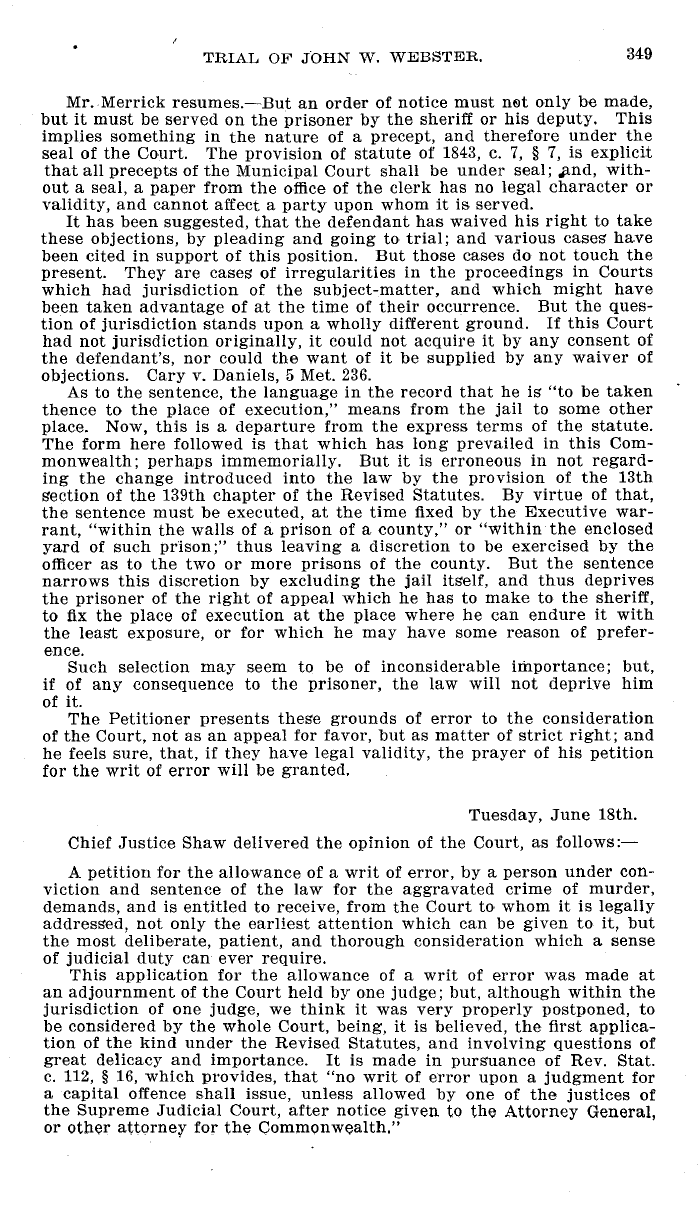|
TRIAL OF JOHN W. WEBSTER. 349
Mr..Merrick resumes.-But an order of notice must not only be made,
but it must be served on the prisoner by the sheriff or his deputy. This
implies something in the nature of a precept, and therefore under the
seal of the Court. The provision of statute of 1843, c. 7, § 7, is explicit
that all precepts of the Municipal Court shall be under seal; jnd, with-
out a seal, a paper from the office of the clerk has no legal character or
validity, and cannot affect a party upon whom it is served.
It has been suggested, that the defendant has waived his right to take
these objections, by pleading and going to trial; and various cases have
been cited in support of this position. But those cases do not touch the
present. They are cases of irregularities in the proceedings in Courts
which had jurisdiction of the subject-matter, and which might have
been taken advantage of at the time of their occurrence. But the ques-
tion of jurisdiction stands upon a wholly different ground. If this Court
had not jurisdiction originally, it could not acquire it by any consent of
the defendant's, nor could the want of it be supplied by any waiver of
objections. Cary v. Daniels, 5 Met. 236.
As to the sentence, the language in the record that he is "to be taken
thence to the place of execution," means from the jail to some other
place. Now, this is a departure from the express terms of the statute.
The form here followed is that which has long prevailed in this Com-
monwealth; perhaps immemorially. But it is erroneous in not regard-
ing the change introduced into the law by the provision of the 13th
section of the 139th chapter of the Revised Statutes. By virtue of that,
the sentence must be executed, at the time fixed by the Executive war-
rant, "within the walls of a prison of a county," or "within the enclosed
yard of such prison;" thus leaving a discretion to be exercised by the
officer as to the two or more prisons of the county. But the sentence
narrows this discretion by excluding the jail itself, and thus deprives
the prisoner of the right of appeal which he has to make to the sheriff,
to fix the place of execution at the place where he can endure it with
the least exposure, or for which he may have some reason of prefer-
ence.
Such selection may seem to be of inconsiderable importance; but,
if of any consequence to the prisoner, the law will not deprive him
of it.
The Petitioner presents these grounds of error to the consideration
of the Court, not as an appeal for favor, but as matter of strict right; and
he feels sure, that, if they have legal validity, the prayer of his petition
for the writ of error will be granted.
Tuesday, June 18th.
Chief Justice Shaw delivered the opinion of the Court, as follows: -
A petition for the allowance of a writ of error, by a person under con-
viction and sentence of the law for the aggravated crime of murder,
demands, and is entitled to receive, from the Court to whom it is legally
addressed, not only the earliest attention which can be given to it, but
the most deliberate, patient, and thorough consideration which a sense
of judicial duty can ever require.
This application for the allowance of a writ of error was made at
an adjournment of the Court held by one judge; but, although within the
jurisdiction of one judge, we think it was very properly postponed, to
be considered by the whole Court, being, it is believed, the first applica-
tion of the kind under the Revised Statutes, and involving questions of
great delicacy and importance. It is made in pursuance of Rev. Stat.
c. 112, § 16, which provides, that "no writ of error upon a judgment for
a capital offence shall issue, unless allowed by one of the justices of
the Supreme Judicial Court, after notice given to the Attorney General,
or other attorney for the Commonwealth,"
|

